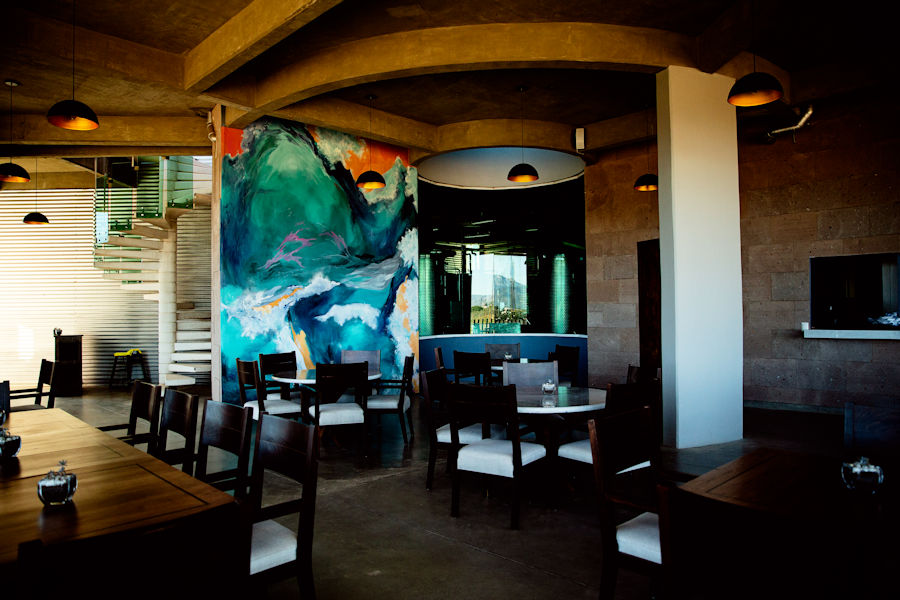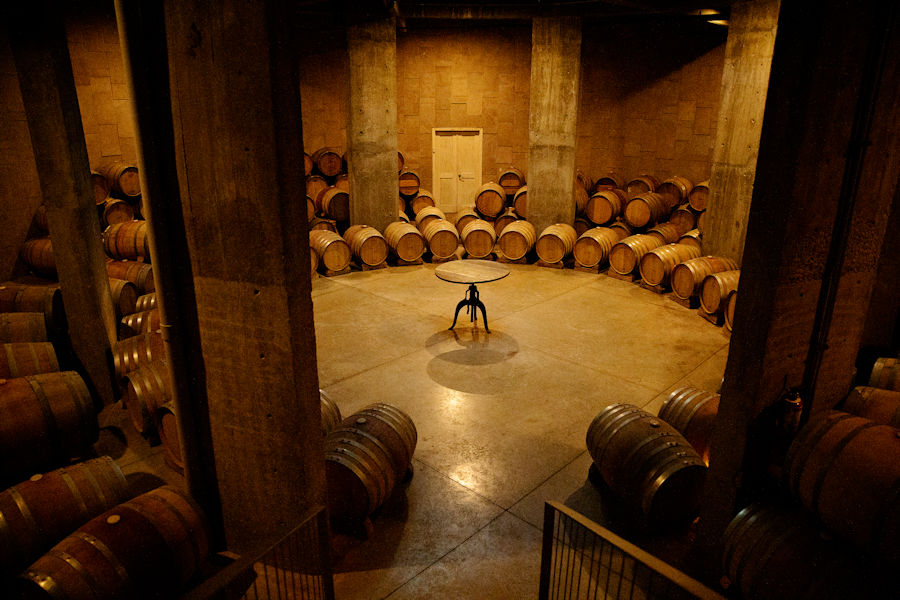 |  |
Driving through the wonders of the ancient boulder fields, the hot sun touches the heavy laden vines; the 2019 harvest is about to begin. Two very striking structures are seen from the road, this is Hilo Negro and restaurant ’emat. Architect and part owner, Ramón Salyado, created cutting edge buildings of glass, steel and concrete. The new wine tasting room is just off the road and there is easy parking. Today I will drive on up the hill to where the wine is produced and the cava is found, along with the restaurant. I am met by Gustavo and a group of happy staff from the restaurant. First we take in the giant stainless steel fermentation tanks, filled with processing wine, which is then fed by gravity through the floor into waiting barrels in the cava below. Gravity feed is a much gentler processing for the developing wine than the use of the electric pumps. Down a series of stairs, Gustavo opens the door into the cava where the temperature drops dramatically. The cava is built half underground and today the air conditioning is necessary to maintain the appropriate temperature. Their forms are filled with life that you can almost feel, as the wine within matures. The barrels curve around in a half circle and resemble slumbering brown bears.
From here we visit briefly the ’emat restaurant with an absolutely stunning view of the mountains, all the way to Sierra Blanca. Gustavo begins to share the story, “’emat is a Kumiai word that includes both earth and sea and is proud to offer a Farm to Table menu. The restaurant brings fresh produce right from the growers in the valley everyday as well as local fish and beef. They also use the local cheeses and even make a mango ice cream in season.” The waitress brings us a chilled beet drink that is very refreshing on this summer afternoon. He continues, “Hilo Negro, means Black Thread. Here in Mexico there is a very deep meaning to this which the owners wanted to convey. The thought is that there is thread of life that moves through everything and is of great importance. The men who began this project felt as if they had found the life thread in this land.”

“Water is the most important thing to any project, with plans to produce a fine wine. Here at the base of the mountains we are fortunate to have the rain water filter down through the mountains, creating the purest quality.” I mention how beautiful the natural granite boulders are and Gustavo agrees, “Yes, we love the boulders and you see how the owners respect their presence.” And it was one of the first things I noticed, how the landscaping and the buildings utilized their strength and beauty. “We even use the micro climates they create, as they reflect and retain the heat. We are a little closer to the ocean so we have misty mornings. We are in a perfect Mediterranean climate.”
We drive back down to the impressive tasting room. Gustavo points out, “You see the whole building is on stilts, so that the stones remain in place and become part of the presentation.” Upon entering I am struck with the architecture that seems to pull the gaze completely through the building and into the next one across the patio. It seemed the creator even used the reflection of glass and steel structure to create the powerful effect. I took a moment to enjoy Ramón Salyado’s vision. The bar is central with ample space inside as well as a covered patio to take in the lovely view. Gustavo introduces the first of the four wines that we will try. Staying with the theme of the thread, all the wines have names of sewing stitches. The first is a 2018 Sauvignon Blanc and Viognier blend that has not passed through the barrel. It is called, “Invisible” named for a fine stitch you can’t see. The Viognier grape gives this young white wine authority. It is fresh with pear and good acidity. I believe this will surprise anyone who does not think they care for white wine.

Next comes the 2017 Ricrac, a blend of Cabernet Sauvignon, Nebbiolo and Syrah with one year in the barrel and 8 months in the bottle. This is a delicious blend and fills the mouth quickly with the full fruit forward. It gives a light tannin finish. “Our winemaker, Daniel Lonnberg, is a well-known oenologist from Chile, so he brings some of his earlier knowledge to Baja California wines. Chile is calling me, I hope to travel there one day to learn from them… my mother is not too happy about my idea.” Gustavo smiles lovingly. Third in the lineup is the 2016 ZigZag blend of Nebbiolo and Syrah. It has one year in French and American oak. This is a wine that you do not rush through. It is meant to drink slowly with friends and demands a pairing. Gustavo shares, “We like very much people who come to meet our wines.” There is quite a different culture in Mexico that thrives on beer and tequila. The culture of wine is more about what Gustavo calls “meeting” the essence of the grape with respect as if an elder person. ZigZag is rich and full bodied with blackberry and marmalade tones. I really wished I had a square of chocolate to accompany it.
The fourth and final tasting is the 2016 Escala, with a stitch that looks like tiny mesas running around the lip of the bottle. It is 100% Syrah with fourteen months in French oak and is their Premium label. This is a dark wine of infinite possibility. Escala will mature into a rich dark forest of truffles, peppery and a hint of spice and balanced acidity. While the wines are still young from this new winery, they are most definitely poised to be extremely popular. Already the word has spread and their weekends can be quite busy for they offer easy access and a restaurant that entertains well into the warm summer evenings.
Article by Martina
Photography by Cintia Soto